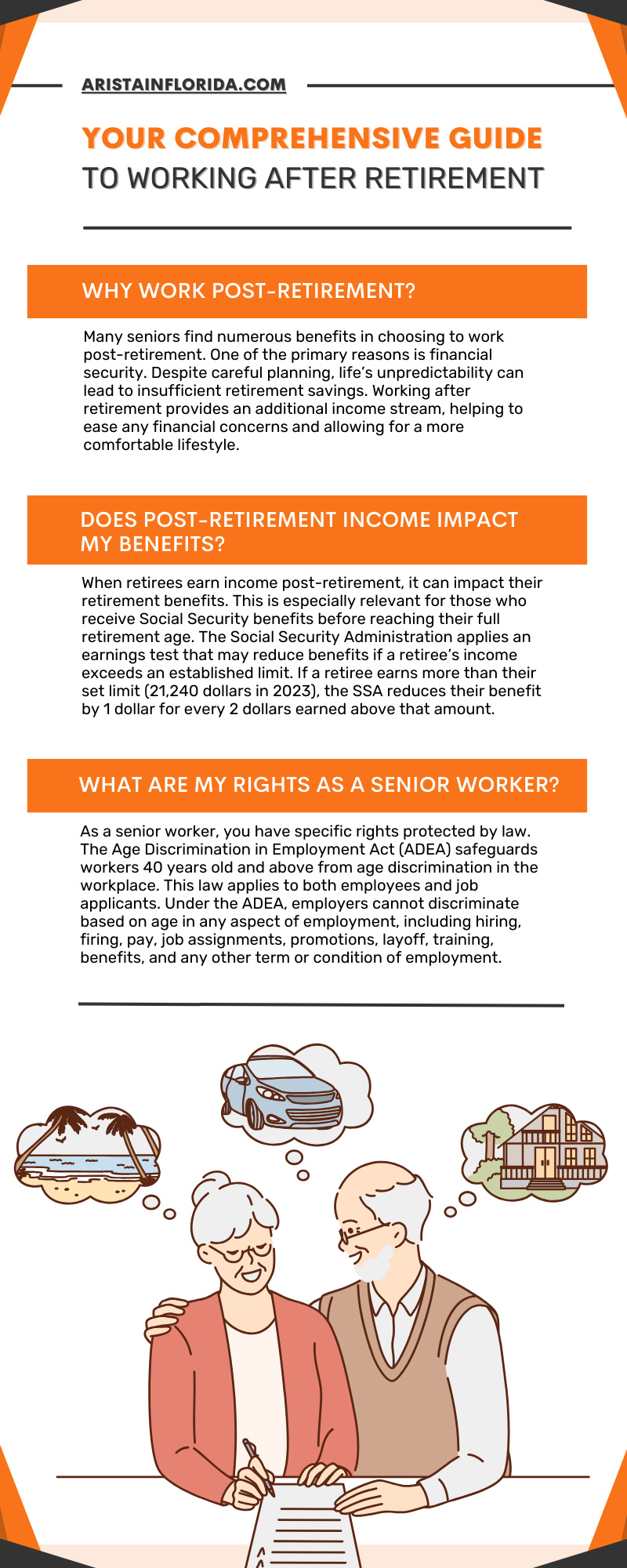Welcome to your comprehensive guide to working after retirement! As surprising as it may sound, retirement doesn’t always signal the end of a professional career. Whether driven by financial security, intellectual stimulation, or the desire to stay socially engaged, an increasing number of seniors are choosing to reenter the workforce during their golden years. This guide will help you navigate this exciting journey by providing you with valuable insights into why and how you can pursue employment post-retirement.
Why Work Post-Retirement?
Many seniors find numerous benefits in choosing to work post-retirement. One of the primary reasons is financial security. Despite careful planning, life’s unpredictability can lead to insufficient retirement savings. Working after retirement provides an additional income stream, helping to ease any financial concerns and allowing for a more comfortable lifestyle.
However, the advantages extend beyond the monetary aspect. Working post-retirement offers a sense of purpose and fulfillment. Many seniors enjoy the intellectual stimulation that comes from being part of a work environment. It also creates a structured routine, promoting mental and physical health. Additionally, working enhances social connections, combating feelings of isolation that some retirees experience. Engaging in post-retirement work can positively contribute to a senior’s quality of life.
Does Post-Retirement Income Impact My Benefits?
When retirees earn income post-retirement, it can impact their retirement benefits. This is especially relevant for those who receive Social Security benefits before reaching their full retirement age. The Social Security Administration applies an earnings test that may reduce benefits if a retiree’s income exceeds an established limit. If a retiree earns more than their set limit (21,240 dollars in 2023), the SSA reduces their benefit by 1 dollar for every 2 dollars earned above that amount.
However, you don’t lose these reductions forever. Once a retiree reaches their full retirement age, the Social Security Administration recalculates their benefit amount to account for months when they withheld benefits due to excess earnings.
Thus, the impact of post-retirement income on Social Security benefits is complex and depends on various factors, such as the retiree’s age, income level, and the timing of benefit claims. Retirees should consult with a financial advisor or the Social Security Administration to understand how their post-retirement income might affect their benefits.
What Are My Rights as a Senior Worker?
As a senior worker, you have specific rights protected by law. The Age Discrimination in Employment Act (ADEA) safeguards workers 40 years old and above from age discrimination in the workplace. This law applies to both employees and job applicants. Under the ADEA, employers cannot discriminate based on age in any aspect of employment, including hiring, firing, pay, job assignments, promotions, layoff, training, benefits, and any other term or condition of employment.
Furthermore, the Older Workers Benefit Protection Act (OWBPA), which is part of the ADEA, prohibits employers from denying benefits to older employees. It ensures that benefits meet certain standards for all workers, regardless of age. In addition to these legal protections, the Equal Employment Opportunity Commission (EEOC) enforces laws that protect seniors from age-based harassment and discrimination. As a senior worker, you should familiarize yourself with these rights before reentering the working world.
Which Careers Should I Pursue?
Now that you understand the benefits, impacts, and basics of post-retirement work, it’s time to consider your next career. Let’s explore various working situations based on their hourly requirements, payout, and overall structure. From there, you can determine an ideal job for your golden years!
Full-Time vs. Part-Time vs. Flexible Hours
When deciding on the kind of job to pursue after retirement, a crucial factor to consider is how much time you wish to dedicate to your new role. Full-time positions typically require around 40 hours per week and offer a stable income and sometimes benefits. On the other hand, part-time jobs require fewer hours, providing more flexibility but often at the expense of lower pay. Jobs offering flexible hours are an ideal middle ground for seniors, allowing you to set your schedule while also earning an income.
Volunteer and Non-Profit Work
Volunteer and non-profit work provides a fulfilling way to spend time after retirement. While these roles may not always offer financial compensation, they provide immense gratification by contributing to a cause or community that you care about. These roles range from local community service to positions within larger non-profit organizations. You can find freelance and volunteer positions for multiple causes around your community by browsing help-wanted ads online!
Contract-Based Employment
Contract-based employment refers to jobs where you work on a specific project for a defined period. This option can be attractive if you prefer having a clear end date to your commitments and enjoy the flexibility of choosing new projects. Examples include consulting roles, freelance writing, or graphic design.
Notably, seniors who love their first careers can pursue contract-based employment through former employers! Many businesses offer retirees part-time consulting work following their time at the company. If you enjoy your former employer, this is the ideal retirement situation for you. Speak to your employer before retiring to work out a suitable plan for the future.
Seasonal Jobs
Seasonal jobs are another excellent option for retirees. These roles, which occur during specific seasons or times of the year, can provide a nice change of pace and an opportunity to earn extra income. Examples include working at a holiday retail store in the winter, tax preparation service during the spring, and voting poll work every few years in the fall. Other seasonal positions that are ideal for seniors include substitute educators, camp faculty, local sports stadium attendants, and more. Importantly, many seasonal jobs operate in non-conventional environments, creating a more enriching experience day in and day out!
What if I Don’t Want To Work?
Choosing not to work in retirement is a perfectly valid decision. Retirement offers a unique opportunity to focus on personal passions, hobbies, and interests that you may not have had time for during your working years. You might choose to devote more time to a hobby such as painting or gardening, explore new interests, or travel extensively. Spending more quality time with family and friends is also possible. Remember, retirement is a personal journey that should reflect your desires and aspirations.
Follow this comprehensive guide to working after retirement and ensure a smooth and successful transition back into the working world. Regardless of your career plans, consider the setting for your golden years. Browse our selection of excellent Lakewood Ranch senior living homes here at Arista Realty and find the perfect retirement destination for you!




